De Britse schrijver Peter Mayle werd geboren in Brighton op 14 juni 1939. Zie ook alle tags voor Peter Mayle op dit blog.
Uit: Encore Provence
“We wallowed in the convenience of America, in the efficiency and the extraordinary variety of choice, and we practiced native customs. We came to know California wines. We shopped by phone. We drove sedately. We took vitamins and occasionally remembered to worry about cholesterol. We tried to watch television. I gave up taking cigars to restaurants, but smoked them furtively in private. There was even a period when we drank eight glasses of water a day. In other words, we did our best to adapt.
And yet there was something missing. Or rather, an entire spectrum of sights and sounds and smells and sensations that we had taken for granted in Provence, from the smell of thyme in the fields to the swirl and jostle of Sunday-morning markets. Very few weeks went by without a twinge of what I can best describe as homesickness.
Returning to a place where you have been happy is generally regarded as a mistake. Memory is a notoriously biased and sentimental editor, selecting what it wants to keep and invariably making a few cosmetic changes to past events. With rose-colored hindsight, the good times become magical; the bad times fade and eventually disappear, leaving only a seductive blur of sunlit days and the laughter of friends. Was it really like that? Would it be like that again?”
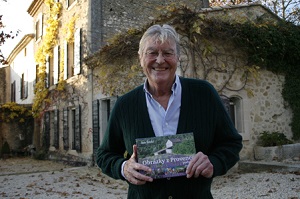
De Amerikaans-Poolse schrijver Jerzy Kosiński werd geboren in Łódź op 14 juni 1933. Zie ook alle tags voor Jerzy Kosiński op dit blog.
Uit: The painted bird
“When noon approached, Lekh hastened his steps and wiped the perspiration from his brow more often. The most important hour of his day was nearing. A woman locally nicknamed Stupid Ludmila was waiting for him in some distant forest clearing known only to the two of them. I would proudly trot behind him, the bag of twitching birds slung over my shoulder.
The forest became increasingly dense and forbidding. The slimy striped trunks of snake-colored hornbeams shot straight up into the clouds. The linden trees, all of which, according to Lekh, remembered the very beginnings of the human race, stood broad-shouldered, their trunks resembling coats of mail festooned with the gray patina of mosses. The oaks stretched out of their trunks like the necks of starving birds looking for food, and obscured the sun with gloomy branches, casting the pines and poplars and lindens into shadow. Sometimes Lekh would stop and silently look at some spoors in the crannies of decaying bark, and in tree knots and gallnuts full of black, curious holes from whose interior shone bare white wood. We would pass through groves of young birches with lean, fragile shoots, diffidently flexing their thin, small branches and buds.
Through the gauzy curtain of foliage we were noticed by perching flocks of birds who became frightened and would soar away with beating wings. Their chirping mixed with the chorus of bees murmuring around us like a moving, gleaming cloud. Lekh protected his face with his hands and fled from the bees to a denser thicket, while I ran at his heels holding on to the bag of birds and basket of traps, waving my hand to drive off the harassing and vengeful swarm.
Stupid Ludmila was a strange woman and I feared her increasingly. She was well built and taller than the other women. Her hair, seemingly never cut, cascaded down her shoulders. She had large breasts, which hung nearly to her belly, and strong muscular calves. In the summer she went around dressed only in a faded sack which revealed her breasts and a clump of red hair at her crotch. Men and boys would tell of the pranks they played with Ludmila when she was in the mood. The village women often tried to trap her but, as Lekh said with pride, Ludmila’s tail was windblown and no one could catch her against her will. She would disappear in the undergrowth like a starling and creep out when no one was around.”
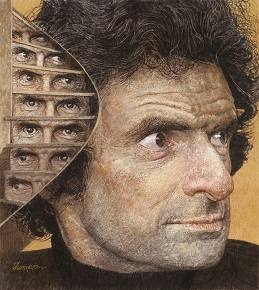
Jerzy Kosinski – Steps 72 door John Thompson
De Amerikaanse schrijfster en abolitioniste Harriet Beecher Stowe werd geboren in Litchfield, Connecticut, op 14 juni 1811. Zie ook alle tags voor Harriet Beecher Stowe op dit blog.
Uit: Uncle Tom’s Cabin
“Hulloa, Jim Crow!” said Mr. Shelby, whistling, and snapping a bunch of raisins towards him, “pick that up, now!” The child scampered, with all his little strength, after the prize, while his master laughed. “Come here, Jim Crow,” said he. The child came up, and the master patted the curly head, and chucked him under the chin.
“Now, Jim, show this gentleman how you can dance and sing.” The boy commenced one of those wild, grotesque songs common among the negroes, in a rich, clear voice, accompanying his singing with many comic evolutions of the hands, feet, and whole body, all in perfect time to the music.
“Bravo!” said Haley, throwing him a quarter of an orange. “Now, Jim, walk like old Uncle Cudjoe, when he has the rheumatism,” said his master. Instantly the flexible limbs of the child assumed the appearance of deformity and distortion, as, with his back humped up, and his master’s stick in his hand, he hobbled about the room, his childish face drawn into a doleful pucker, and spitting from right to left, in imitation of an old man.
“Well, then, Haley, how will you trade?” said Mr. Shelby, after an uneasy interval of silence. “Well, haven’t you a boy or gal that you could throw in with Tom?” “Hum!—none that I could well spare; to tell the truth, it’s only hard necessity makes me willing to sell at all. I don’t like parting with any of my hands, that’s a fact.”
Here the door opened, and a small quadroon boy, between four and five years of age, entered the room. There was something in his appearance remarkably beautiful and engaging. His black hair, fine as floss silk, hung in glossy curls about his round, dimpled face, while a pair of large dark eyes, full of fire and softness, looked out from beneath the rich, long lashes, as he peered curiously into the apartment.”
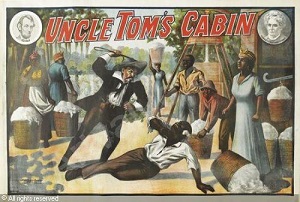
Cover
De Chinees-Amerikaanse schrijver Laurence Michael Yep werd geboren op 14 juni 1948 in in San Francisco. Zie ook alle tags voor Laurence Yep op dit blog.
Uit: Designs By Isabelle
“HDC, so she had danced some of the most important roles. Then, after retiring from dancing, she’d become the ballet mistress at HDC. Ms. Ferri was so nice that I couldn’t help wishing she taught ballet at my school, Anna Hart School of the Arts, so that I could have her all week instead of just on the weekends. But Ms. Ferri was too busy conducting the daily class for the HDC’s professional dancers. And this year, she was busy rehearsing her own role in The Nutcracker, too—the role of Mother Ginger. Ms. Ferri’s stilts were made out of metal rods about a yard high. In New York City Ballet’s version of The Nutcracker, men played Mother Ginger because the costume was so big and heavy. But Ms. Ferri was tall and strong enough to handle it. After years of playing Mother Ginger, she was a pro at managing the costume’s weight while she walked on stilts. No one would see the stilts, because she’d wear a skirt big enough to hide them—plus eight kids. Ms. Ferri glanced my way when she heard the door to the studio close behind me. “Where have you been, Isabelle?”
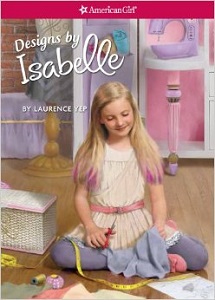
Cover
De Franse dichter René Char werd geboren op 14 juni 1907 in L’Isle-sur-la-Sorgue, Vaucluse. Zie ook mijn blog van 14 juni 2010 en eveneens alle tags voor René Char op dit blog.
Poètes
La tristesse des illettrés dans les ténèbres des bouteilles
L’inquiétude imperceptible des charrons
Les pièces de monnaie dans la vase profonde
Dans les nacelles de l’enclume
Vit le poète solitaire
Grande brouette des marécages
Les Pyrénées
Montagne des grands abusés,
Au sommet de vos tours fiévreuses
Faiblit la dernière clarté.
Rien que le vide et l’avalanche,
La détresse et le regret!
Tous ces troubadours mal-aimés
Ont vu blanchir dans un été
Leur doux royaume pessimiste.
Ah! la neige est inexorable
Qui aime qu’on souffre à ses pieds,
Qui veut que l’on meure glacé
Quand on a vécu dans les sables.
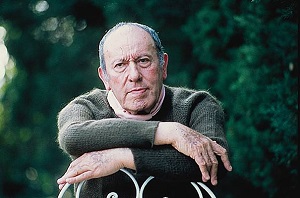

1 thoughts on “Peter Mayle, Jerzy Kosinski, Harriet Beecher Stowe, Laurence Yep, René Char”
De commentaren zijn gesloten